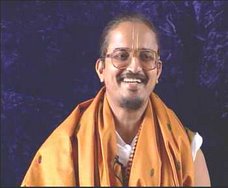Nama Article 27th November 2013
Efficacy of Naama Bhajana
Source: Discourses by Sri Sri Chandrasekharendra Saraswati [Maha Periyava] of Kaanchi Kaamakoti Peetam (today is Maha Periyava's Jayanthi)
Advaita Vedanta has clearly explained the conception of Paramatma (परमात्मा) as the Supreme Reality, the Ultimate Truth and Limitless Bliss, and also indicated the path of God-realization. Sri Adi Sankara has clearly expounded this bhakti and jnana maargaas (paths) in his numerous works. Sri Ramanuja laid emphasis on absolute surrender, saranaagati (शरणागति). Some evolved souls, in their natural humility, even wondered whether they are sufficiently enlightened to say "Thou art my only hope", which is the essence of saranaagati, and so concentrated on naama japa (नामजप) the repetition of the names of God. These great teachers in effect said: "We have the tongue and there are the two sacred words, Rama and Siva. That is enough for us".
Saint Jeyadeva of Bengal was the pioneer of the Bhajan school. It is said that while Jeyadeva sang his heart-melting songs in praise of the Lord, his wife, Padmavati, danced and Lord Krishna, appearing in the form of a child directed the steps of dancing Padmavati. Hence, Jeyadeva addressed Lord Krishna as "Padmaavateecharana-chaarana-chakravarthi". The path blazed by Jeyadeva was followed by Krishna Chaitanya, Tukaram, Meera Bai, and others in North India. Correspondingly there lived in South India, Purandaradasa, Bhodendra, Ayyaval, Sadguru Swami and others. Purandaradasa proclaimed to the world, Ninna naama ondu iddare saaku, "Your name is enough for me". Bhodendra has written a number of works stressing the efficacy of naama japa. Even to-day, at the commencement of a bhajana or a kalakshepam, the blessings of Bhodendra, Ayyaval and Sadguru Swami are invoked. Great Saivite saints, who have sung the praise of Siva naama, also graced South India. Lord Krishna has given humanity, through Arjuna, the solemn assurance that He will liberate all persons from their sins – अहं त्वा र्वपापेभ्योमोक्षयिष्यामि मा शुच: Aham-tva sarvapapebhyo mokshayishyaami maa-suchah. If you are liberated from sin, you need not worry about or fear anything else, because you will remain unaffected by trials and grief. That is why Rama naama is called taaraka mantra (तारक मन्त्र) taaraka meaning steering clear of sins). He who takes to the path of naama japa should do so in all humility, maintaining a high standard of personal conduct. He should not think or say that jnana and bhakti are not necessary and that naama japa alone will do. On the other hand, he should feel in all humility that because he is incapable of jnana and bhakti, he has taken to naama japa. To add interest or attraction to naama japa, music and instrumental accompaniments have come to be introduced. That is how the bhajan system has come to be in vogue. By doing naama japa with single-minded devotion, we can achieve the spiritual purpose of our life.
Chant the Mahamantra Nama kirtan :
Hare Rama Hare Rama Rama Rama Hare Hare
Hare Krishna Hare Krishna Krishna Krishna Hare Hare

No comments:
Post a Comment